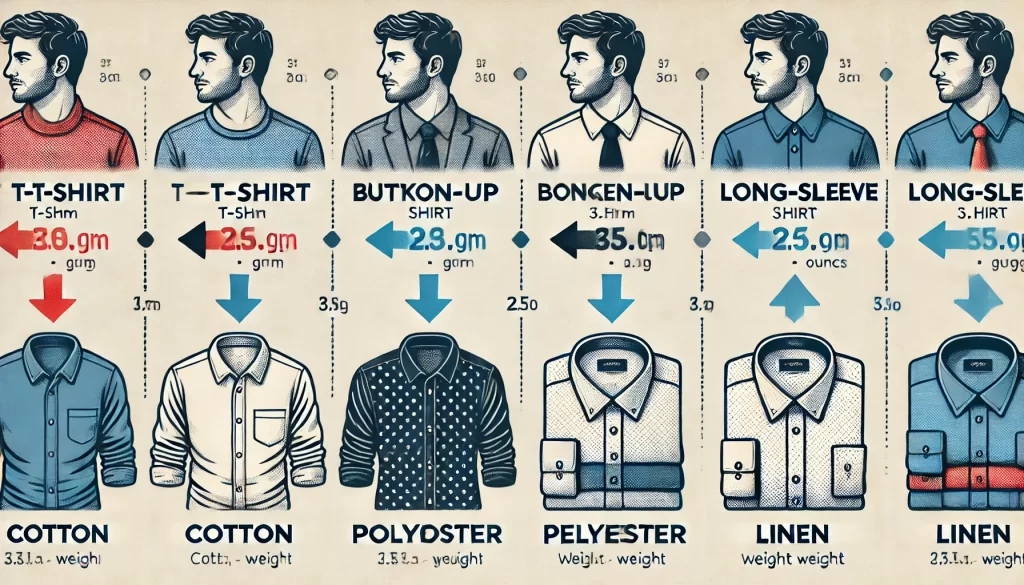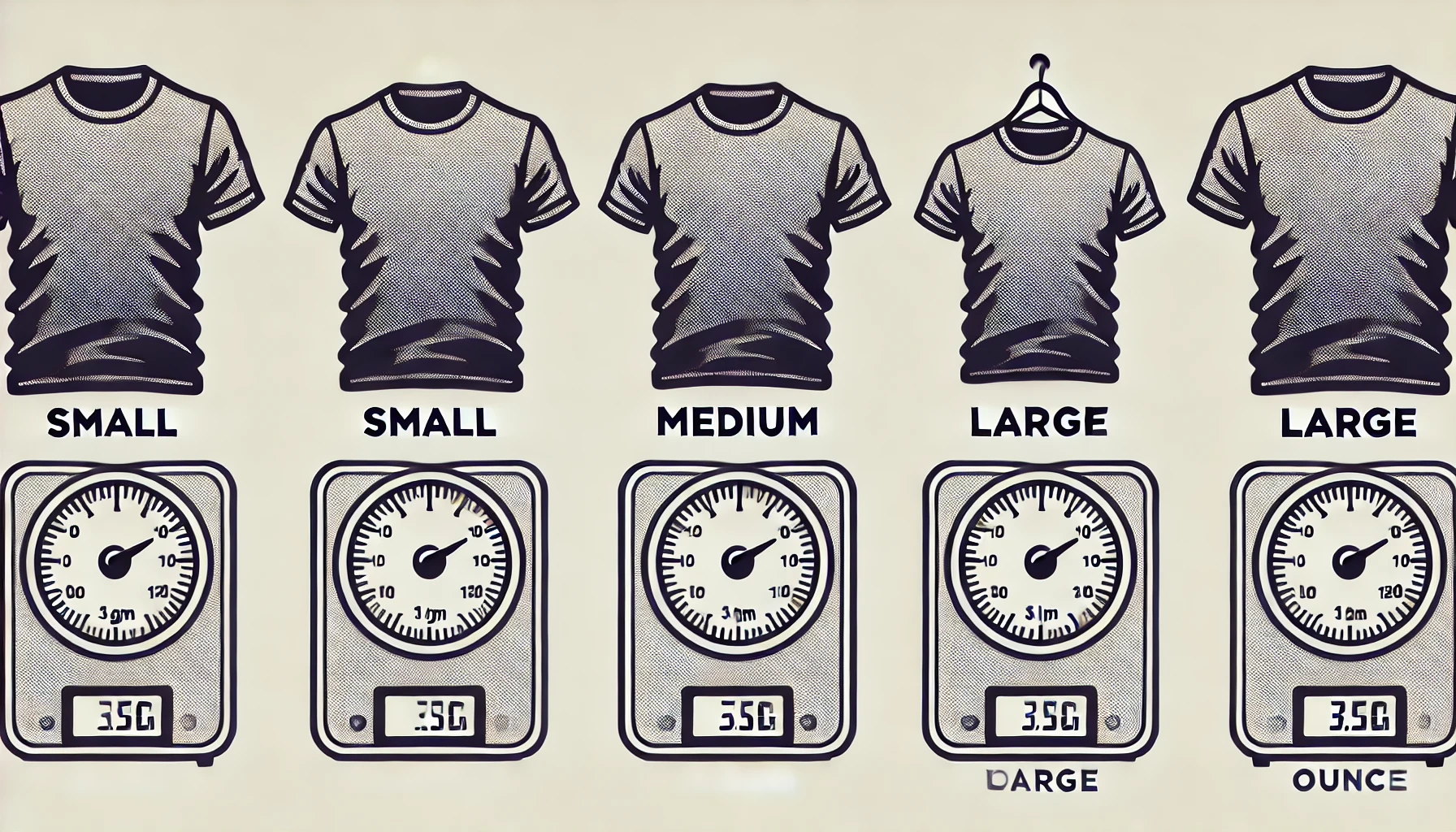Table of Contents
When you’re shopping for clothes or packing for a trip, you might wonder, how much does a shirt weigh? You may be surprised to learn that the weight of a shirt can vary more than you’d expect. From different materials to shirt types, there are several factors that influence its weight. In this article, we’ll break down everything you need to know about shirt weight, so you’ll never have to guess again.
What Affects the Weight of a Shirt?

Shirt weight is determined by multiple factors, and understanding these can help you make better choices when selecting clothes. Let’s explore the main factors that affect a shirt’s weight.
Material Type
One of the biggest factors that affect how much does a shirt weigh is the type of material used. Different fabrics have different densities and thicknesses, which can significantly impact the overall weight. Here are some common materials:
- Cotton Shirts: A classic cotton t-shirt usually weighs between 5-8 ounces (140-230 grams), depending on the size and thickness of the cotton.
- Polyester Shirts: Polyester shirts tend to be lighter than cotton. They can weigh around 3-5 ounces (85-140 grams) since polyester is a synthetic material designed to be lightweight.
- Blended Fabric Shirts: Shirts made from a blend of cotton and polyester or other materials often weigh somewhere in between. The exact weight will depend on the ratio of materials in the blend.
Shirt Size and Cut
The size and style of a shirt also contribute to how much it weighs. A larger shirt, obviously, uses more fabric, making it heavier. Here’s how size and cut come into play:
- Smaller Sizes: Small and medium-sized shirts usually weigh less than large or extra-large ones. A small t-shirt might weigh around 5 ounces (140 grams), while a larger one can reach up to 8 ounces (230 grams).
- Long-Sleeve vs. Short-Sleeve: Long-sleeve shirts tend to be heavier than short-sleeve shirts simply because more fabric is used. A long-sleeve shirt can add an extra 2-3 ounces (55-85 grams) compared to a short-sleeve version.
How Much Does a Shirt Weigh by Type?

Shirts come in all shapes and sizes, and each type weighs differently. Let’s break down the weights of various shirt types to give you a clearer picture.
Casual T-Shirts
T-shirts are probably the most common type of shirt, and their weight varies depending on the fabric and cut. On average, a casual t-shirt weighs between 5-8 ounces (140-230 grams). Lightweight t-shirts made of thin cotton or polyester can be as light as 3 ounces (85 grams), while thicker, more durable shirts may weigh closer to 8 ounces.
Dress Shirts
Dress shirts, made from thicker materials like cotton blends, often weigh more than casual t-shirts. These shirts typically weigh between 8-12 ounces (230-340 grams), depending on the size and fabric. Long-sleeve dress shirts also tend to weigh more because they use more fabric.
Sweatshirts and Hoodies
Sweatshirts and hoodies are much heavier than t-shirts or dress shirts. This is due to the thicker materials used to provide warmth. A typical sweatshirt or hoodie can weigh anywhere from 16 ounces (450 grams) to 24 ounces (680 grams), depending on the fabric and whether or not it has a hood.
Why Does Shirt Weight Matter?
“Why should I care about how much does a shirt weigh?” one may ask. You might be surprised to learn how much shirt weight affects your daily life. For the following reasons, it is significant:
Travel and Packing
When packing for a trip, shirt weight can be a major factor, especially if you’re limited by baggage weight. Lighter shirts made from polyester or thin cotton can help you stay under airline weight limits and allow you to pack more.
Comfort and Breathability
Heavier shirts are often thicker, which can make them less breathable, especially in warm weather. Lightweight shirts, like those made from cotton or polyester, allow more airflow and help keep you cool in hot climates.
Shipping Costs
If you’re ordering shirts online or sending clothes in the mail, the weight of the shirt can affect shipping costs. Heavier shirts will cost more to ship, which is something to keep in mind if you’re purchasing or sending clothing in bulk.
Also Read: How Much Does a Boat Cost? Shocking Truth About Prices!
How to Weigh a Shirt at Home
If you ever need to know how much does a shirt weigh and don’t have a scale, there are some simple ways to estimate it.
Using a Kitchen Scale
One of the easiest ways to weigh a shirt is to use a kitchen scale. Simply fold the shirt neatly and place it on the scale. Make sure the scale is set to grams or ounces to get an accurate measurement.
Estimating by Fabric Type
If you don’t have access to a scale, you can estimate a shirt’s weight based on its material and size. For example, if you know the shirt is made of lightweight polyester, it will likely weigh around 3-4 ounces. A heavy cotton shirt might weigh closer to 7-8 ounces.
So, how much does a shirt weigh? As we’ve seen, the answer depends on a variety of factors, from the type of material used to the size and style of the shirt. Lightweight shirts made from polyester or cotton blends typically weigh less than 5 ounces, while heavier options like dress shirts or hoodies can weigh anywhere from 8-24 ounces.
Whether you’re packing for a trip, shopping for clothes, or shipping garments, knowing the weight of your shirts can save you time and effort. When you wonder, “How much does a shirt weigh?” the next time. you’ll have all the information you need!

